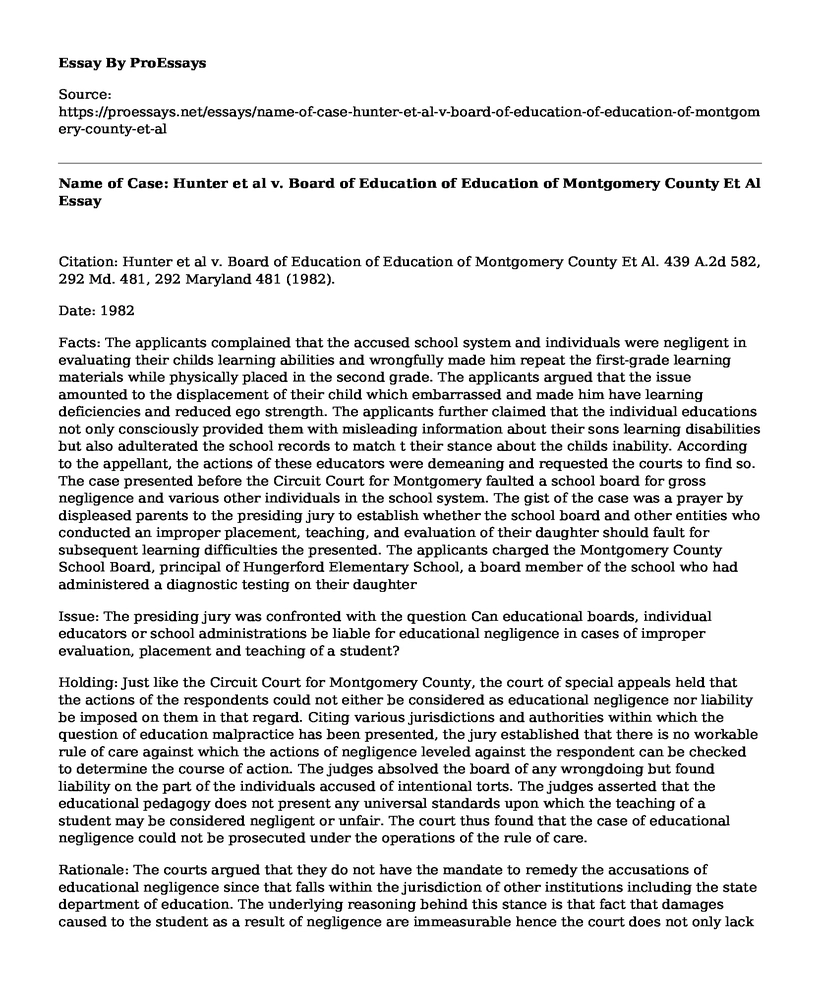Citation: Hunter et al v. Board of Education of Education of Montgomery County Et Al. 439 A.2d 582, 292 Md. 481, 292 Maryland 481 (1982).
Date: 1982
Facts: The applicants complained that the accused school system and individuals were negligent in evaluating their childs learning abilities and wrongfully made him repeat the first-grade learning materials while physically placed in the second grade. The applicants argued that the issue amounted to the displacement of their child which embarrassed and made him have learning deficiencies and reduced ego strength. The applicants further claimed that the individual educations not only consciously provided them with misleading information about their sons learning disabilities but also adulterated the school records to match t their stance about the childs inability. According to the appellant, the actions of these educators were demeaning and requested the courts to find so. The case presented before the Circuit Court for Montgomery faulted a school board for gross negligence and various other individuals in the school system. The gist of the case was a prayer by displeased parents to the presiding jury to establish whether the school board and other entities who conducted an improper placement, teaching, and evaluation of their daughter should fault for subsequent learning difficulties the presented. The applicants charged the Montgomery County School Board, principal of Hungerford Elementary School, a board member of the school who had administered a diagnostic testing on their daughter
Issue: The presiding jury was confronted with the question Can educational boards, individual educators or school administrations be liable for educational negligence in cases of improper evaluation, placement and teaching of a student?
Holding: Just like the Circuit Court for Montgomery County, the court of special appeals held that the actions of the respondents could not either be considered as educational negligence nor liability be imposed on them in that regard. Citing various jurisdictions and authorities within which the question of education malpractice has been presented, the jury established that there is no workable rule of care against which the actions of negligence leveled against the respondent can be checked to determine the course of action. The judges absolved the board of any wrongdoing but found liability on the part of the individuals accused of intentional torts. The judges asserted that the educational pedagogy does not present any universal standards upon which the teaching of a student may be considered negligent or unfair. The court thus found that the case of educational negligence could not be prosecuted under the operations of the rule of care.
Rationale: The courts argued that they do not have the mandate to remedy the accusations of educational negligence since that falls within the jurisdiction of other institutions including the state department of education. The underlying reasoning behind this stance is that fact that damages caused to the student as a result of negligence are immeasurable hence the court does not only lack the ability to quantify but does not also have the mandate to delve into matters concerning the daily operations of the school systems. Ideally, the doctrine of governmental immunity. The question of the mode of student assessment, placement, and grading fall squarely within the precincts of educational policy which is the preserve of the state board of education or the public education administration. However, the decision gave the parents who are discontented with the manner in which the schools handle their students with the recourse of petitioning the country superintendent as stipulated in section4-205 (c) (3) of the Education Article. The parents can only escalate their cases to the courts through the established hierarchy of superintendent, county board of education, and state board of education. This decision is to create order within the administration of justice instead of commissioning arbitrary proceedings with the potential of eliciting a backlash from the established hierarchy.
Reaction: The case affirms the essence of the justice process which is to streamline the course of attaining fairness and amicable resolution of disputes. It is incumbent upon the agencies charged with the responsibility of discharging justice to establish a seamless way of operation with well-delimited jurisdictions. The respect for procedural justice thus becomes the responsibility of every person which the court exemplified by respecting the jurisdiction of other state institutions charged with dispensing justice.
References
Alexander, K., & Alexander, M. D. (2012). American public school law. Belmont, CA: Wadsworth Cengage Learning.
Hunter et al v. Board of Education of Education of Montgomery County Et Al. 439 A.2d 582, 292 Md. 481, 292 Maryland 481 (1982).
Cite this page
Name of Case: Hunter et al v. Board of Education of Education of Montgomery County Et Al. (2021, Sep 01). Retrieved from https://proessays.net/essays/name-of-case-hunter-et-al-v-board-of-education-of-education-of-montgomery-county-et-al
If you are the original author of this essay and no longer wish to have it published on the ProEssays website, please click below to request its removal:
- Essay Example on Personal Knowledge, Skills and Abilities
- Stress in Children - Course Work Example
- Paper Example on Current Statistical Trends in Juvenile Crime
- Paper Example on Blood Sampling in Forensic Analysis: Desiccated Blood Samples
- Obama Care: US Healthcare Reforms and Its Impact - Essay Sample
- Essay on Exploring Factors Impacting Student Learning: Social, Emotional, Economic, and Religious
- Paper Sample on Achieving Academic Success: My Journey to Higher Education & Certifications







